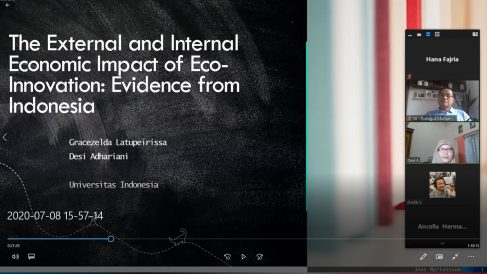Research Sharing Session, Department of Accounting Sciences, FEB UI:
The External and Internal Economic Impact of Eco-Innovation: Evidence from Indonesia
Hana Fajria –FEB UI Public Relations Officer
Depok – (8/7/2020) The Department of Accounting Sciences, FEB UI, held an online Research Sharing Session entitled The External and Internal Economic Impact of Eco-Innovation: Evidence from Indonesia. The session was attended by 54 participants. Desi Adhariani served as speaker and Dodik as moderator. Both are lecturers at the Department of Accounting Sciences, FEB UI.
The session was opened with a remark by Dr. Ancella A. Hermawan, MBA., CA., ACMA., CGMA, Head of the Department of Accounting Sciences, FEB UI. “The objective of this activity is different from the previous ones, but basically it has a similar goal, namely to increase our research productivity and publication. Indeed, research quality and publication has improved, with many research results published in Q1 and Q2 journals. However, we also need to meet AACSB’s accreditation standards because, firstly, not all of us are productive. There are lecturers who have doctoral degrees but who have yet to have their research results published. In other words, they are not Scholarly Academics (SA). Therefore, I call on all of you to meet the requirement and have your papers published. Secondly, not just for Scopus, our Department will hold conferences with Sinta 2 and Sinta 3 accredited national journals. Please make good use of this opportunity to help you create citations,” said Ancella.
Desi Adhariani’s presentation, The External and Internal Economic Impact of Eco-Innovation, was prepared in collaboration with Gracezelda Latupeirissa (PPIA 2018 alumna). It was based Grace’s thesis that took six months to complete. Little has been discussed about the topic, so the paper was approved for publication in accounting journals.
Eco-Innovation is a growing research area that has practical implications for clean production. Although the identification of the economic consequences of eco-innovation has been studied extensively, there are still questions about its impacts on developing countries.
This study examined the effects of Eco-Innovation on the cost of equity capital and company financial performance, as well as the role of political connections as a moderating variable in Indonesia as an emerging market. The research was conducted on a sample of all non-financial companies listed on the Indonesia Stock Exchange from 2011 to 2016.
The data were processed using the panel regression method. This study found that Eco-Innovation does not affect the cost of capital or company performance. However, political connections do, and they moderate the relationship between Eco-Innovation and the cost of capital, albeit in a positive direction. This implies that political connections do not play a role in a company’s Eco-Innovation efforts to build investor confidence.
At the end of the session, Desi shared tips for improving citations, such as looking for the ideal reason of a good publication (international and national), paying attention to ethical issues, promoting own journal, JAKI, and empowering Research Gate, LinkedIn, Academia and other accounts, while still paying attention to the code of ethics.
Desi also provided the following input: Try to read primary resources, use sources from highly reputable journals (top-tier/Q1/Q2), for the Indonesian context try to use sources from reputable international journals AND/OR SINTA 1/2 accredited national journals (including JAKI), avoid citing predatory/low quality journals. (hjtp)
(lem)



